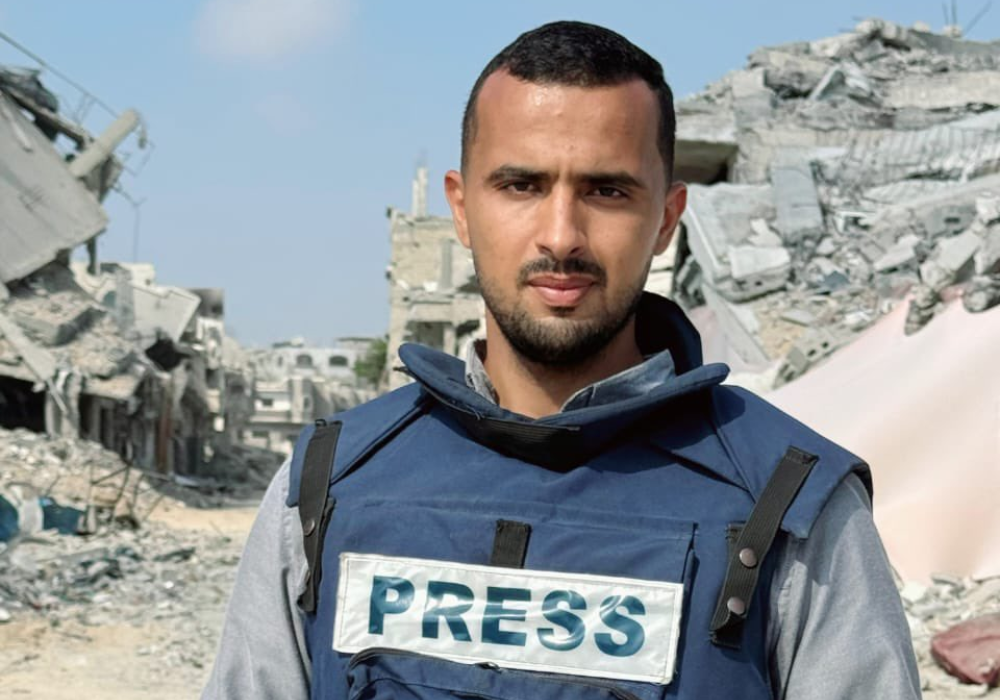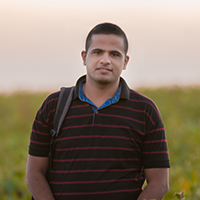The incident was a direct and deliberate targeting of journalist Ismail Al-Ghoul's car, which cannot be seen in any other light. This is evidenced by Israel's pattern of targeting journalists, with the death toll of journalists since the war's onset in October 2023 now standing at 165.
At 4 PM on July 31, Al Jazeera correspondent Ismail Al-Ghoul, cameraman Rami Al-Rifi, and other journalists were covering the reactions of citizens in the Al-Shati refugee camp, west of Gaza City, near the residence of the late Ismail Haniyeh, the head of Hamas' political bureau, following his assassination in Tehran.
Suddenly, Israeli planes, which were constantly flying over the area, dropped a missile near the journalists, which they took as a warning to evacuate the area. Journalists got into two cars and drove in different directions to avoid being targeted. Al Jazeera correspondent Ismail Al-Ghoul and cameraman Rami Al-Rifi, both wearing their protective vests, were in the same vehicle, which had a PRESS insignia on it. Mere minutes later, news broke that the car had been targeted by a guided missile.
Journalist Islam Badr, a correspondent for Al-Araby TV in northern Gaza, described the final moments before the Israeli targeted killing of journalists Ismail Al-Ghoul and Rami Al-Rifi in western Gaza City in an interview with "Al Jazeera Journalism Review." He stated, "The incident was a direct and deliberate targeting of journalist Ismail Al-Ghoul's car, which cannot be seen in any other light. This is evidenced by Israel's pattern of targeting journalists, with the death toll of journalists since the war's onset in October 2023 now standing at 165."
Details of the Assassination
Journalist Osama Al-Ashi was the first to report from the scene where Ismail Al-Ghoul's vehicle was hit. Speaking to "Al Jazeera Journalism Review," he recounted being near the Al-Shati camp when the attack happened, hearing the initial explosion. The blast was later confirmed to have occurred near journalists reporting close to the residence of Ismail Haniyeh, the former political leader of Hamas.
Shortly after, another explosion sounded closer. Al-Ashi, with his equipment in tow, hurried to locate and document the strike. He recounts: "I found a child's body on the ground next to a microphone marked with Al Jazeera's logo, and it dawned on me that the target was their correspondent, Ismail Al-Ghoul, as he was the sole reporter in the area for the network."
Al-Ashi moved quickly towards the targeted vehicle and found the bodies of Al-Ghoul and Al-Rifi lifeless. Al-Ghoul's head had been severed, and the upper part of Al-Rifi's body was shattered, according to his description.
The journalist, who is employed by various Arab and international media outlets, believes the attack was deliberate and clear-cut; the vehicle was struck while traveling at a high velocity, achievable only with a precision-guided missile. He asserts that he saw the missile strike journalists Al-Ghoul and Al-Rifi directly.
Ismail was wearing his press vest, and Rami was carrying the equipment he used for documenting and filming events. In the back seat of the vehicle, there were other tools needed for coverage. The car had a sign indicating that it was carrying journalists, according to Al-Ashi’s testimony, which indicates that "this was a direct targeting of Ismail and Rami, who insisted on continuing their coverage in northern Gaza despite the harsh conditions."
He insisted on continuing his coverage from the northern part of the Gaza Strip, despite the challenges and obstacles he faced. He was arrested and interrogated by the Israeli army, his brother was killed in an Israeli airstrike, and his father passed away during treatment abroad.
The Humanity of Ismail Al-Ghoul
Al Jazeera correspondent Ismail Al-Ghoul was among the journalists who refused to comply with the Israeli orders to evacuate at the beginning of the war on Gaza in October 2023. He insisted on continuing his coverage from the northern part of the Gaza Strip, despite the challenges and obstacles he faced. He was arrested and interrogated by the Israeli army, his brother was killed in an Israeli airstrike; and his father passed away during treatment abroad.
Colleagues of Ismail in northern Gaza testify to his humanity and high professionalism, despite his young age and the short time he had worked as a television correspondent.
Several weeks ago, Ismail Al-Ghoul posted a video on his social media accounts of a child named Muhammad, crying and running towards him after his family's home in the Al-Shati refugee camp, west of Gaza City, was targeted. The child said, "Uncle Ismail, my mom and brother are still under the rubble, and I just barely made it out alive from the bombing." This child was the son of journalist Saeed Hassouna, who told "Al Jazeera Journalism Review," "In that moment, Ismail embraced my son and treated him with a fatherly spirit, easing the trauma he saw in his eyes."
Ismail then called his colleague "Hassouna," offering condolences for the martyrdom of his wife and son Mahdi and reassuring him about the condition of his surviving son Muhammad. Hassouna described Al-Ghoul's words during that call as "sincere, comforting, and reflective of a deep sense of humanity within him."








































